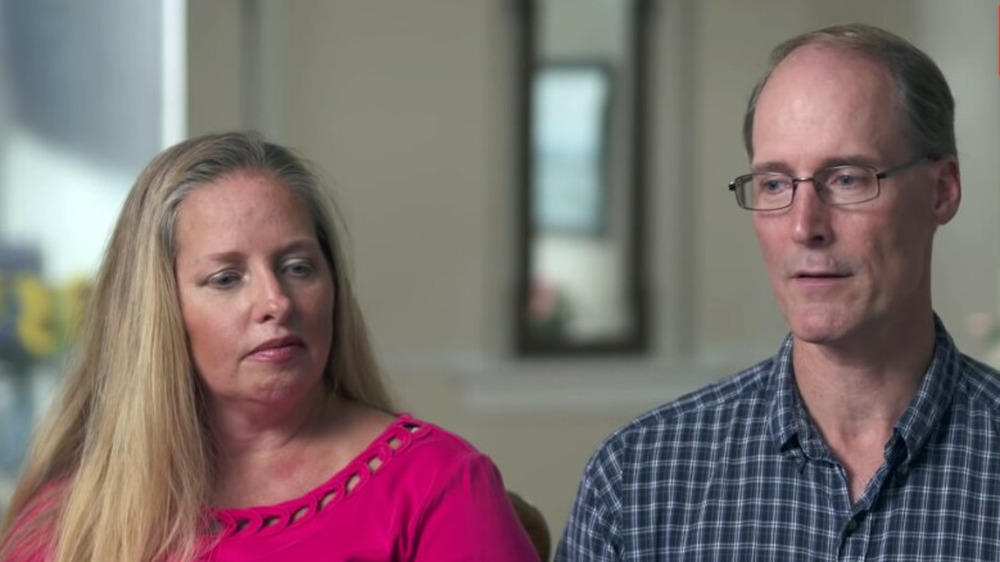The Truth About Welcome To Plathville's Season 2 Drama
Welcome to Plathville's sophomore season showcases a fractured family worlds away from the super-close Plaths we met in season one. Eldest son Ethan and his wife Olivia revealed they'd been pushed to breaking point by his overbearing parents, who refuse to accept Olivia and accused her of leading the younger Plath kids astray, even considering divorce at one point (via YouTube). Teens Micah and Moriah moved out — or were they pushed out? — over their parents' insanely strict rules which, in spite of the family relocating to a stunning new property, remain unchanged.
Poor Ethan is so frustrated with his folks' behavior that he has cut off all contact with Kim and Barry (via YouTube). Meanwhile, things threaten to be heading in the same direction for Ethan's younger siblings as the season premiere culminated with Micah and Moriah confronting their parents over their harsh treatment and lack of preparation for the real world (via YouTube). We spoke to Jaime Bronstein, LCSW, a psychotherapist and licensed clinical social worker, who specializes in relationships, to get her take on the ongoing issues rotting the heart of the Plath family.
Kim and Barry Plath are too controlling
Bronstein surmises the Plaths are having trouble "navigating this new uncharted territory" predominantly because Kim and Barry are intent on keeping their children "in a bubble." She explains that the parents' refusal to allow their kids to play video games or go online, and their insistence on having them dress a certain way, coupled with home schooling them, all contribute to this idea. Likewise, "from what the older kids are saying, the parents aren't as hands-on as they could be making sure that the kids are getting as much education as possible."
As Bronstein notes, when Micah and Moriah confronted their folks, they pointed out their lack of formal education. Although Kim and Barry insist that they want their children to exist in the real world and make their own decisions once they're of age, as far as Micah and Moriah are concerned, their parents didn't adequately prepare them for the real world because they actively kept them from it (via YouTube). Bronstein advises, too, "Kim blatantly tells the camera that she is concerned about the older kids negatively influencing the younger ones, so she does not want them to spend time together unsupervised."
Judgment will keep the Plaths apart
Internet commentators have been tearing Kim and Barry apart, particularly when it comes to daughter Lydia's prayer closet, which most viewers find creepy. As Bronstein acknowledges, "The main issue in the show continues to be the fact that Kim and Barry are too controlling." In particular, she points to how judgmental Kim is, noting it appears, "she lacks empathy or the ability to understand that not everyone will want to live their lives how she wants to live her life." Bronstein reckons Kim needs to acknowledge that judgment will keep the family apart, rather than bringing them together, because "it is impossible to connect with someone you judge or who you want to change in any manner."
Considering the younger kids will most likely follow Ethan, Micah, and Moriah's lead once the time comes, Kim will need to "learn to compromise someday if she wants to have a healthy working relationship with her children" because "too much co-dependency is not healthy." Bronstein explains the Plath parents are holding their children back as, "You will never know who you are and be a grown-up individual in the world if you rely too heavily on your parents' thoughts and opinions."
It's up to Kim and Barry Plath to make things right
Although Kim is openly judgmental, Bronstein feels Barry is more willing to compromise. However, he has issues with Olivia that have, demonstrably, caused a serious rift with his son whom, as Bronstein points out, tried his best to appeal to his father's better judgment by pleading with him to treat Olivia better. "It is never easy when a parent doesn't accept a child's spouse. One would hope that parents would be happy for their child if their child is happy, but unfortunately, not all families work that way," Bronstein notes.
Although the Plaths might live off the grid to a certain extent, she notes that avoiding the world isn't doing them any good, as "it doesn't help when you are shut-off to being open to someone who has a different lifestyle than you. Not everyone in the world will be exactly like you, not your kids, and certainly not your kids' spouses." Bronstein warns it's up to the Plath parents to make things right with Ethan and Olivia. She notes, "If Kim and Barry could get past their limitations and judgments, things could be more harmonious, and they could work out something."



